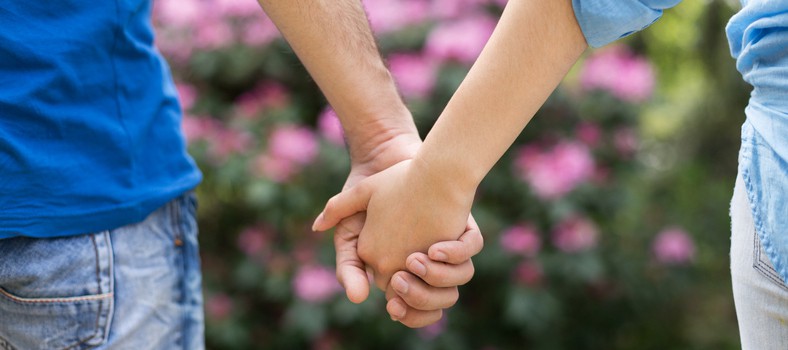When children start dating, parents prepare themselves for broken curfews, late-night phone calls, a few bad decisions, and a broken heart now and again. What most parents don’t expect is that there is a chance that their child will be a victim of abuse by their high school love.
Alzein Pediatrics is marking Teen Dating Violence Awareness Month by helping parents understand types of violence, the warning signs of violence, and how to help their child leave the situation as quickly and thoroughly as possible.
Four types of intimate violence can happen to adults and children alike: physical violence, sexual violence, psychological aggression, and stalking. It is important to note that with physical and sexual violence when the assailant attempts to hurt the victim but fails (for example, throwing a heavy object at them but missing) that is categorized as abuse. Victims should not wait until their assailant is “successful” – actually hitting them with that heavy object – before they reach out for help.
Is Teen Dating Violence happening?
As with all statistics, parents want to believe that teenage dating violence is not present in their community. However, teen dating violence affects approximately 10 percent of all teenagers between the ages of 12 and 18. Sadly, it’s likely that your children will experience or witness an abusive relationship before they leave high school.
The findings from the CDC’s Youth Risk Behavior Survey and the National Intimate Partner and Sexual Violence Survey found that:
• The number of high school students reporting having experienced physical dating violence in the last year is approximately 1 out of every 11 females and 1 in 14 males.
• High school students who report having experienced sexual dating violence in the last year total 1 in 8 females and 1 in 26 males.
• 26% of women and 15% of men who were victims of abuse by an intimate partner in their life first experienced these or other forms of violence before reaching 18 years of age.
How do I know if my teen is in an abusive relationship?
Yes, there are signs of abuse that can be detected when you know what to look for. Pay attention to changes in their behavior. Did they stop going out with friends completely or will they only go out with friends if the dating partner is also going? Does your child laugh it off? Do they say that they can’t do something they previously loved because “so-and-so gets so jealous?”
In cases of physical and sexual abuse, you may notice your child suddenly wearing long sleeves, covering their arms and legs, or coming home with bruises. When they tell you they ran into “another door” because they are clumsy, trust your instincts and keep asking for the entire story.
Be observant of your child’s partner. Does their partner treat your child with common courtesy and respect, or do they bark orders at them? Do they engage in “playful” but inappropriate behavior like putting your child into a headlock or holding their arms? Does your child ever flinch around their partner, or suddenly, around you? Are there constant fights, resulting in yelling and verbal abuse? These warning signs cannot be ignored.
How can I help my teen if they are being abused in a Relationship?
The lasting effects of teenage dating violence can be long-term. They may begin to participate in illegal behaviors such as drug use or theft, or antisocial behaviors, such as bullying others or withdrawing from school and family events. Abuse can also result in low self-esteem, depression, and anxiety, and can also lead to suicidal thoughts.
Calmly point out the signs of an abusive relationship you are observing to your child to help them realize the situation they are in. When you talk to your child, always remain supportive and composed. Let your child know that you will always believe them and that you are concerned for their safety.
To encourage your child to talk to you, speak about the behaviors; do not attack the person. Use phrases like, “How do you feel when “Pat” says you’re stupid?” or “It makes me very uncomfortable when “Pat” blocks you in a corner and doesn’t let you move. How do you feel when that happens?” Do not make accusations or disparaging remarks. You want your child to talk to you, not push you away.
Talk about the next steps together. Your child may already feel like they are not in control of the situation, so begin the healing process by giving them control over what happens next.
Depending on the severity of the abuse, you may want to call Alzein Pediatrics to have a medical and psychological evaluation to assess the best route to healing and recovery for your child.
The abuse severity will also dictate if law enforcement should be involved and if a restraining order is necessary. If the abuse happened on school grounds, the school may need to also be involved.
Abuse of any kind is challenging to navigate. No matter what, make sure your child knows that it is not their fault, they did nothing to “deserve” this, and that you stand behind them. Abuse is a situation where children need a parent’s unquestioning love and support more than ever to keep them safe and secure a happy future.
If you suspect your child is a victim of teen dating violence, please reach out to your provider at Alzein Pediatrics. We are here to provide confidential, healthy support for your family, or visit Our Evergreen Park, Oak Lawn/95th Street, and Urgent Care locations.


